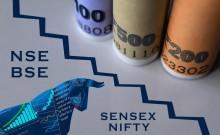Asian stocks snapped a two-day rising streak and fell on Thursday after the U.S. central bank hinted at a December interest rate hike, sending short-term U.S. bond yields to 4-1/2-year highs and pushing the dollar broadly up.
A December U.S. interest rate increase, ordinarily a sign of a healthy global economy, would now come at the worst possible time for export-oriented Asian countries which are grappling with the twin effects of a slowing China and shrinking global trade.
MSCI's broadest index of Asia-Pacific shares outside Japan dropped 0.4 percent, led by a 1 percent fall in Australian shares. While it has risen 12 percent since end-September, it is still down 10 percent so far this year.
"Emerging markets are facing some stiff headwinds particularly in the form of a historic China transition away from manufacturing-led growth and an entrenched slowdown in global trade," said Jeremy Lawson, senior international economist at Standard Life Investments.
In fresh signs that Asian countries were feeling the heat, central banks from Australia to Thailand voiced caution at their scheduled policy meetings this week while retail sales in Hong Kong fell for the seventh consecutive month.
The U.S. was ready for higher interest rates if upcoming economic data justified them, said Federal Reserve Chair Yellen, in her first public comments since the Fed's meeting last week.
"If the incoming information supports that expectation then our statement indicates that December would be a live possibility," she said.
Her measured optimism was in direct contrast with the disappointing state of affairs for company earnings in Asia.
So far, September quarter net income for companies in Asia-ex Japan has missed consensus estimates by 6.5 percent, according to Morgan Stanley while Japan, a relatively bright spot so far, has also faltered.
Wall Street shares also slipped on Wednesday, with S&P 500 Index falling 0.4 percent. Futures were pointing to a weak start.
"Her comments confirmed that a rate hike in December is the Fed's base case scenario", Tomoaki Shishido, fixed-income strategist at Nomura Securities said.
U.S. economic data on Wednesday supported Yellen's guarded optimism, with private employers hiring steadily in October and a jump in new orders buoying activity in the services sector.
The U.S. bond market reacted promptly, with the policy-sensitive U.S. two-year notes yield rising to 0.850 percent in Asian trade on Thursday, its highest level since April 2011. It has gained nearly 30 bps since early October.
The near-term Federal fund futures contract fell to the lowest levels in a month or longer, suggesting the market is pricing more than a 50 percent chance of a rate hike at the Fed's next meeting on 15-16 December.

















